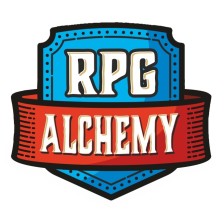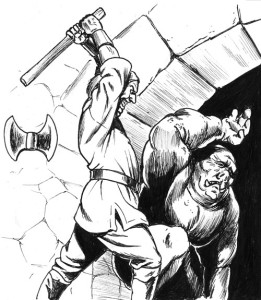Virtually all roleplaying games feature a mechanic designed to determine the results of an action along a success or failure axis. Some systems will also determine a degree of success or failure, but in general the resolution mechanic focuses on the line between succeeding and failing. Recently however, I’ve been looking at this from a slightly different angle. I’ve been looking less at failing and more at the cost of success.
For those of you that follow us here at RPG Alchemy you know I’m a big fan of the various games based on Apocalypse World. Basically all of these games provide one of three results when you roll the dice; you do what you set out to do without difficulty, you do it with some complication or price, and finally, the GM tells you what happens. I really like the last result. While many times the GM might tell you that you failed at whatever you were attempting, the door is really open for results that are so much more interesting. With this in mind let’s take a look at some different takes on failure:
Partial Success
Using this allows the a hero to progress a bit in their attempt but forces them to adapt to new elements that come up due to their failure. Here’s a few possibilities:
- You are able to track the orcs back to their lair, however they were aware of your presence and have set an ambush.
- The first part of the trap mechanism is deactivated but it was more complex than you initially thought. You’re going to need to work on it again next round.
- You��manage to dodge the poison dart trap��and avoid getting hurt, but now your cloak is pinned to the wall behind you.
- Although the guards haven’t spotted you they seem to be aware that something is amiss and now are actively searching the courtyard.
Failing Differently
I also like to switch things up sometimes by have the character succeed at the primary aspect of their task but fail at some secondary aspect. Doing this can keep the adventure moving forward while also presenting a new obstacle or challenge for the hero (or heroes) to overcome. Here are a few possible examples of this kind of failure:
- You manage��to open the lock but your picks jam the mechanism, you’re going to have to use brute strength to force the door open now.
- You manage to craft a potion, just not the type you intended and now you’re not sure what it does.
- Your attack damages your opponent but you are knocked prone while executing it.
- You resist taking damage from the poison but you are sick to your stomach and weakened for a while.
Cost of Success
Putting a cost on success allows a hero to accomplish what they set out to do but forces them to deal with the loss of some resource or advantage. Here’s a few I’ve used in the past:
- You clear the ravine but hurt yourself in the process.
- You manage to get your opponent into a grapple but manage to drop your weapon belt and backpack in the process.
- You shove your opponent off the cliff but he grabs your weapon in the process and it goes over the ledge with him.
- You manage to convince the crime lord to help you and your allies however she demands a boon from you to be named later.
Final Thoughts
All of these options are similar and work well in concert. As a GM it is usually more fun and interesting to simply throw complications at your players than to worry about failure. In fact, focusing on complications and the cost of success is the cornerstone to building your improvisational skill set. These days most of my campaigns are built upon the “interesting” complications that find their way into the characters’ lives!


That’s a great idea. I’ve often thought about (and factored into game mechanics) gradations of success, and to a lesser degree gradations of failure. It’s an interesting take on it, and one I think really works well – the three levels of success/failure. I’ll be incorporating more of this concept into my own RPG actually. It just works when you allow the GM the flexibility to decide what happens with the failure – so much more interesting than just “you fail” but instead things get more interesting!
Hi John,
Great article!
Looking for interesting ways to “fail forward” is not always easy to do in the moment. You have some superb example here, and I shall have to borrow several of them.
Many thanks
Phil
Phil Nicholls recently posted…Listening Around: Drive to Work at 250
Thank you both!
Since incorporating these ideas into my gaming I find that our sessions are more dynamic and I’m doing less prep work. In fact I’ve run several one-shot games at conventions where my prep work was nothing more than a set-up and just see what happens. As players react to the initial event(s) I let their die rolls, “failures” in particular, open up interesting situations and elements and I just see where things go.
John Lewis recently posted…Hero Kids and My Heroic Kids
Hi John,
“Since incorporating these ideas into my gaming I find that our sessions are more dynamic and I����m doing less prep work.”
I find EXACTLY the same experience. It is almost as though the game is running itself, as just about every roll will generate some form of plot development.
All the best
Phil
Phil Nicholls recently posted…The Sigil Courier: Chapter 27
You hit the nail right on the head Phil. Not only does my game feel as though it’s running itself I find that in many cases prep work actually interferes with the organic development of the plot.
These days I virtually never prepare any sort of “plot”. Instead my prep-work is just creating things like lists of NPC names, brief location descriptions, and notes regarding what has already happened in the campaign.
John Lewis recently posted…Hero Kids and My Heroic Kids
Hi John,
WE are running the SAME GAME!Okay, perhaps not the exact same game, but we are having the same low-prep, improvisational experience. I am so glad it is not just me.
I even wrote an article called Location Aspects, about involving the Players in the creation of the setting. My Players love this, and it means even less work for me.
I really must write another article to see if you share the same processes.
All the best
Phil
Phil Nicholls recently posted…Sigil PD: Chapter 28, Part 2
I think you’ll like today’s article, Dungeon World: Adventure Builder.
John Lewis recently posted…Dungeon World: Adventure Builder